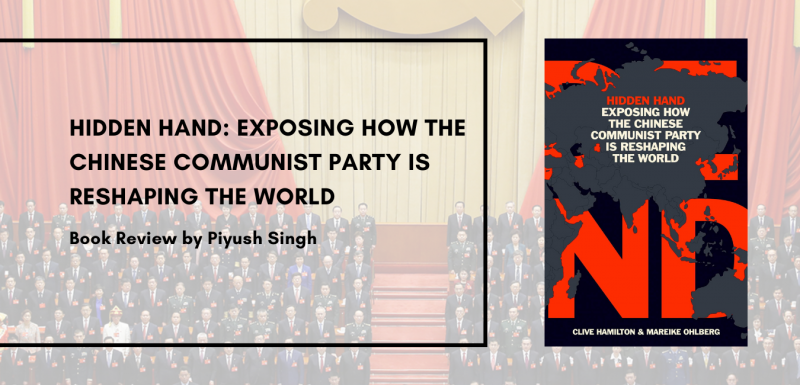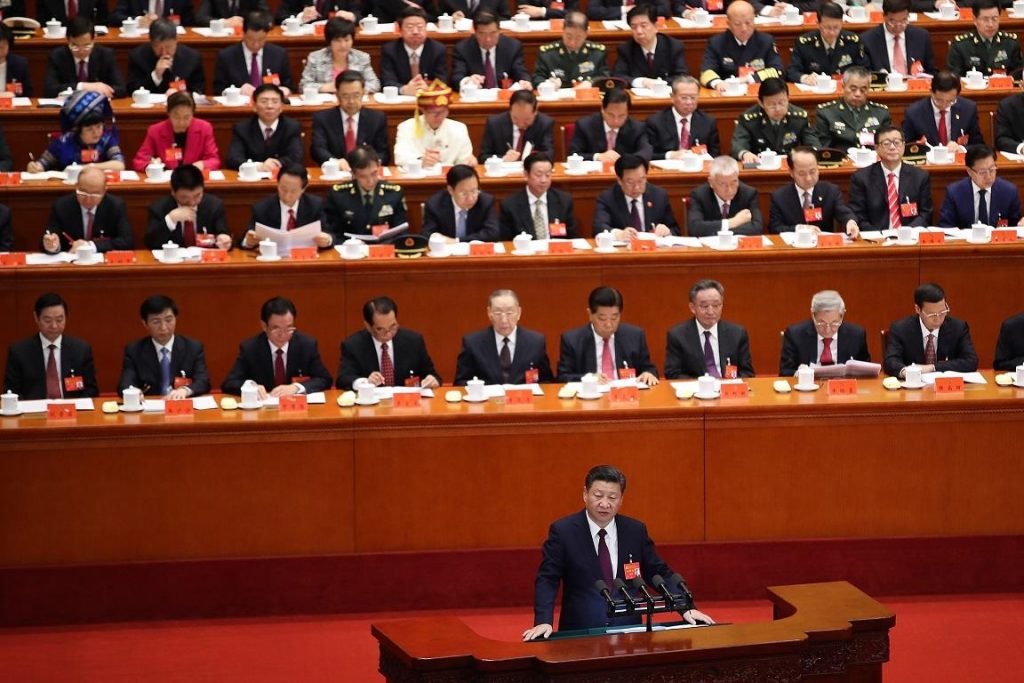[Book Review] Hidden Hand: Exposing How the Chinese Communist Party is Reshaping the World

The creation and poignant acceptance of a neo-liberal order after the fall of the Soviet Union, was followed by aspersions regarding the ‘China story’. The PRC (People’s Republic of China), however has repeatedly defied such predictions and risen as a significant player in world politics. But our own understanding of an authoritarian China is built much more on knowledge embroiled in the centralized and highly planned messaging-campaigns than factual evidence. In short, right from a common pedestrian reading about China on some ‘credible’ online source to an ambassador dispatched in Beijing; there is one political party curating and packaging knowledge for them both. This is what the book Hidden Hand does a commendable job in uncovering.
The CCP (Chinese Communist Party) has depended on tactics that are targeted at gaining a multi-dimensional influence all across the world (primarily North America and Western Europe) through overt and covert methods micro-managed from the Party headquarters. What makes this a critical read for any Sinologist is this integral coupling of the CCP and PRC, which is crucial for a holistic understanding of CCP’s ambitions, its methods and the terrifying limits it is ready to traverse. It is this astounding control exercised by the Party through meticulous strategies aimed at leveraging the most powerful voices and institutions across the world that is laid out in extensive detail in “Hidden Hand” by Clive Hamilton and Mareike Ohlberg. Providing excruciating details about the darker (and often unnoticed) facets of Beijing’s influence, Hidden Hand compels you to question the credibility and substance of the leaders (and other elites in the West) who have vital economic interests in mainland China. Events like the embarrassment brought by John McCallum (Canadian ambassador to China) on publicly advising Huawei’s CFO, Meng Wanzhou ways to escape extradition, the connection between Hunter Biden’s (Joe Biden’s son) lucrative businesses in China, Beijing’s oversight in the board rooms of Blackrock, McKinsey & co., Goldman Sachs, the backstories are engaging and research gone into it is exquisite. What sets Hidden Hand apart is that Ohlberg and Hamilton’s attempt at unveiling the ‘enigma’ surrounding the CCP begins with controversial stories that every China-enthusiast might have come across but failed to fathom the crucial details that lied below the surface. Although it doesn’t suggest ‘ways’ to deal with the organs of the CCP that are alarmingly linked to western institutions and the Party’s top leadership alike, the 300 pages are Pandora’s box to educate (and warn) one on the tactics and strategies deployed by Beijing to pocket the most powerful leaders and organizations on the planet.
On the Wall Street, the tentacles of CCP extend deep into the decision-making bodies of the world’s largest corporations where both its influence and leverage is only surging. A disturbing example would include Gary Cohn, Trump’s Director for the National Economic Council, who held a multimillion-dollar stake in the Industrial and Commercial Bank of China, a party-controlled bank. Similarly, Trump’s appointment of treasury secretary, Steven Mnuchin who held stocks worth several million dollars in Goldman Sachs (and paved the way for its mammoth investments in the US) along with Jared Kushner who held huge investments in Blackstone, the investment company owned by Trump’s old friend and Chinese-sympathizer, Stephen Schwarzman explains the inefficacy of the “tough-stance” promised by Trump’s administration.

The ‘reach’ in Beijing’s out-reach
Before drawing the reader’s attention to the numerous ways in which Beijing has ‘bought’ its way into circles that push a heavily misleading “responsible” image of China and its leadership, Hamilton and Ohlberg start by drawing an elaborate overview of the CCP’s ambitions. For every nation, diplomacy is statecraft of narrative-building but no other state has mastered it like Beijing, as shown by the gradual (yet significant) shifts in Chinese leadership’s statements suited to every context. Revelations that come out as the book progresses can be put into perspective through some oft-repeated statements (along with the tweaks that feature) in CCP’s internal as well as external political discourse. Statements like “For the CCP to feel safe, our message should be the loudest of our times” and Xi’s call to his cadres to prepare for a “long-term co-operation and struggle with the capitalist system” before the Chinese communism triumphs show how heavily Xi’s CCP remains embroiled in achieving an ‘ideological’ supremacy. It is insights like these, that Hidden Hand draws on, to affirm the ‘Leninist approach’ towards shaping foreign policy as well as a domestic opinion regarding the West. The authors also draw significant wisdom from CCP’s internal discourse post the Tiananmen massacre and fall of the Berlin Wall, highlighting the anxieties that came with the Soviet’s disintegration.
Though it may seem far-fetched to colour every action of the CCP in ideology, the authors back most of their claims by linking the entanglement of a concerned official/wing to a known body of the CCP or the PLA (People’s Liberation Army). While organs like the United Work Front and the Liaison Department are pretty infamous for their covert actions on foreign territories, it’s the link of these organs to hundreds and thousands of other creatively named and seemingly harmless ‘sub-organs’ brought out in the book that is worrisome and frightening.
While the book has earned the tag of being a ‘sequel’ to Hamilton’s recently published book Silent Invasion, the best-seller on China’s influence operations in Australia; it’s hard to draw that intimate connection considering that Hidden Hand unlike Silent Invasion does not connect the numerous dots by putting together a mechanism and reasoning behind China’s covert projects in the globe’s largest economies.

Although a review is not space enough to explore the notable ways in which a book adds to one’s intellectual perspective on a subject as deep as the CCP, every Sinologist has tons of dots to collect from these. The commonalities that feature in CCP’s strategy across continents are also good enough to base an understanding of their playbook for influence and propaganda. Proverbs like ‘surrounding the cities from the countryside and ‘creating a new multilateral order’, courting local and/or upcoming leaders in foreign states, favouring bilateralism over strong multilateral are some common tenets that are tweaked, flexed and repeatedly practised ways to build influence and through it the Party’s power. For someone looking to break into the world of CCP’s ‘project’, the subtitle “exposing how the CCP is reshaping the world” speaks for itself and makes it a must-read.


















